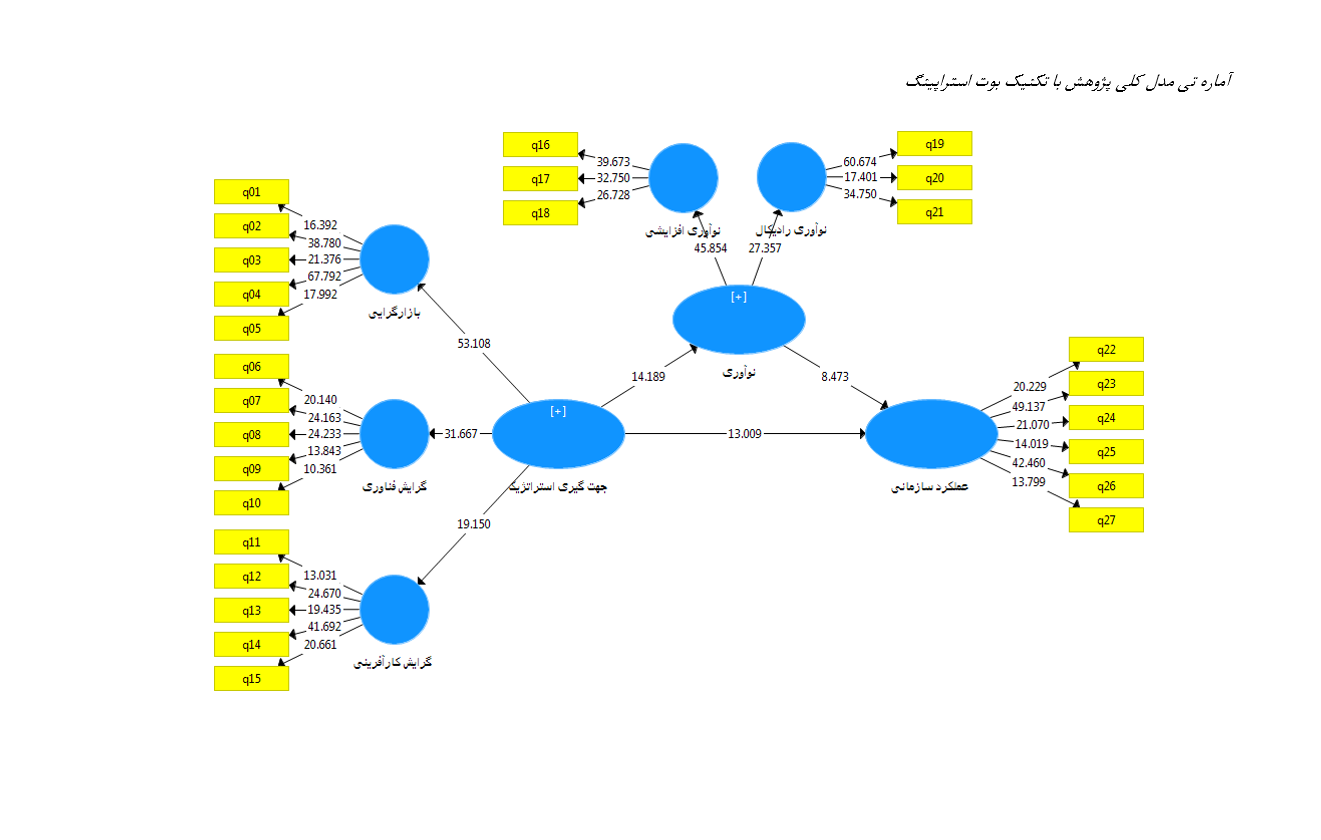The Impact of Business Strategic Orientation on Organizational Performance with the Mediating Role of Innovation
Keywords:
Strategic Orientation, Organizational Performance, Organizational InnovationAbstract
Global changes, transformations in strategic management, and the necessity of transitioning from programmatic orientations to cultural orientations to positively improve organizational performance have become essential. Strategic orientations are guiding principles that influence the organization's strategic programs and activities, and organizational success is generally attributed to strategic orientation. Strategic orientation reflects organizations' efforts to shape organizational behaviors in line with managerial strategies. The objective of this study is to examine strategic orientation and organizational performance, considering the mediating role of innovation. The statistical population of this study consisted of 1,200 employees and managers of a bus company, from which 291 individuals were selected as a sample based on a formula. In the end, 285 questionnaires were collected for analysis. The data collection tool in this study was a questionnaire. The research hypotheses were tested using the Smart PLS software. The results showed that strategic orientation significantly affects organizational performance. Strategic orientation significantly affects innovation. Innovation significantly affects organizational performance. Innovation has a mediating effect on the relationship between strategic orientation and organizational performance.
Downloads
References
Abdulrab, M., Al-Mamary, Y. H. S., Alwaheeb, M. A., Alshammari, N. G. M., Balhareth, H., & Al-Shammari, S. A.
(2021). Mediating role of strategic orientations in the relationship between entrepreneurial orientation and
performance of Saudi SMEs. Brazilian Journal of Operations & Production Management, 18(4).
https://doi.org/10.14488/BJOPM.2021.029
Adiguzel, Z., & Sonmez Cakir, F. (2022). Examining the effects of strategic orientation and motivation on performance
and innovation in the production sector of automobile spare parts. European Journal of Management Studies, 27(2),
-148. https://doi.org/10.1108/EJMS-01-2022-0007
Akter, S., Hossain, M. A., Lu, Q., & Shams, S. M. R. (2021). Big data-driven strategic orientation in international
marketing. International Marketing Review, 38(5), 927-947. https://doi.org/10.1108/IMR-11-2020-0256
Appiah, M. K., Akolaa, R. A., & Ayisi-Addo, A. K. (2022). Modeling the impact of macroenvironmental forces on
investment in renewable energy technologies in Ghana: The moderating role of Entrepreneurship orientation
dimensions. Cogent Economics & Finance, 10(1). https://doi.org/10.1080/23322039.2022.2071387
Asghari, A. F., & Amani, R. (2016). Surveying the influence of market and innovation orientation on E-Loyalty (Case
Study: An Iranian Company). Journal of Administrative Management, Education + Training, 12(4), 43-50.
https://www.sid.ir/paper/521239/en
Blaique, L., Abu-Salim, T., Asad Mir, F., & Omahony, B. (2022). The impact of social and organisational capital on
service innovation capability during COVID-19: The mediating role of strategic environmental scanning. European
Journal of Innovation Management. https://doi.org/10.1108/EJIM-01-2022-0023
Cao, T. T., Le, P. B., & Nguyen, N. T. M. (2022). Impacts of high-involvement HRM practices on organizational
innovation capability: The mediating mechanism of tacit and explicit knowledge sharing. International Journal of
Innovation Science, 14(5), 733-749. https://doi.org/10.1108/IJIS-05-2021-0091
Capriati, M., & Divella, M. (2020). Firms' organisational capabilities and innovation generation: The case of Italy.
Economics of Innovation & New Technology, 31(6), 447-466. https://doi.org/10.1080/10438599.2020.1823674
Charoensukmongkol, P. (2016). The interconnections between bribery, political network, government supports, and their
consequences on export performance of small and medium enterprises in Thailand. Journal of International
Entrepreneurship, 14(2), 259-276. https://doi.org/10.1007/s10843-016-0164-1
Charoensukmongkol, P. (2022). Does entrepreneurs' improvisational behavior improve firm performance in time of
crisis? Management Research Review, 45(1), 26-46. https://doi.org/10.1108/MRR-12-2020-0738
Fan, F., Zhang, X., & Wang, X. (2022). Are there political cycles hidden inside collaborative innovation efficiency? An
empirical study based on Chinese cities. Science & Public Policy, 49(3), 532-551.
https://doi.org/10.1093/scipol/scac005
Huo, M., & Li, C. (2022). Impact of managerial power on enterprise innovation performance: The mediating roles of
financing constraints and strategic orientation. Chinese Management Studies, 17(3), 637-659.
https://doi.org/10.1108/CMS-06-2021-0249
Ibarra-Cisneros, M. A., Demuner-Flores, M. D. R., & Hernández-Perlines, F. (2021). Strategic orientations, firm
performance and the moderating effect of absorptive capacity. Journal of Strategy and Management, 14(4), 582-
https://doi.org/10.1108/JSMA-05-2020-0121
Iqbal, S., Rasheed, M., Khan, H., & Siddiqi, A. (2021). Human resource practices and organizational innovation
capability: Role of knowledge management. VINE Journal of Information and Knowledge Management Systems,
(5), 732-748. https://doi.org/10.1108/VJIKMS-02-2020-0033
Jassmy, K., Banacu, C., & Bhaya, Z. (2018). Strategic orientation for improving financial performance case study in AlQadissiya governorate banking. Management and Economics Review, 2(1), 147-164.
https://www.tandfonline.com/doi/full/10.1080/23311975.2023.2211366
Kumar, K., Boesso, G., Favotto, F., & Menini, A. (2012). Strategic Orientation, Innovation Patterns and Performances
of SMEs and Large Companies. Journal of Small Business and Enterprise Development, 19, 132-145.
https://doi.org/10.1108/14626001211196442
Liu, G., Liu, W., & Ko, W. W. (2022). Organisational capabilities and small and medium sized firms' attainment of
innovation outcomes: The moderating roles of exports and formal business networks. International Journal of
Operations & Production Management, 42(7), 1022-1060. https://doi.org/10.1108/IJOPM-09-2021-0600
Maclean, M., Appiah, M. K., & Addo, J. F. (2023). Implications of strategic orientation on firms' performance in a lower
middle-income country: Does organizational innovation capability matter? Cogent Business & Management.
https://doi.org/10.1080/23311975.2023.2211366
Magalhães-Teixeira, A. M., Roldán, J. L., & Leal Millán, A. G. (2024). Strategic-hybrid orientations and perceived
business performance in medium/high-tech SMEs. European Business Review. https://doi.org/10.1108/EBR-09-
-0272
Obeidat, B., Al-Suradi, M., Masa'deh, R., & Tarhini, A. (2016). The Impact of Knowledge Management on Innovation:
An Empirical Study on Jordanian Consultancy Firms. Management Research Review, 39, 1214-1238.
https://doi.org/10.1108/MRR-09-2015-0214
Valos, M. J., & Bednall, D. H. (2010). The Alignment of Market Research with Business Strategy and CRM. Journal of
Strategic Marketing, 18, 187-199. https://doi.org/10.1080/09652540903537022
Zehir, C., Can, E., & Karaboga, T. (2015). Linking Entrepreneurial Orientation to Firm Performance: The Role of
Differentiation Strategy and Innovation Performance. Procedia-Social and Behavioral Sciences, 210, 358-367.

Downloads
Published
Submitted
Revised
Accepted
Issue
Section
License

This work is licensed under a Creative Commons Attribution-NonCommercial 4.0 International License.










